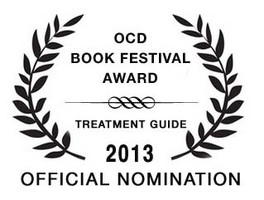
Adobe Acrobat document [58.6 KB]
Family As An Agent of Change
By Karen J. Landsman, PhD
OCD often impacts the entire family, resulting in tremendous confusion and conflict among everyone in the family. It’s important to remember, however, that everyone is trying to cope with the situation the best they can. Through choices made by each family member trying to cope with OCD in the home, OCD can become a family disorder. Fortunately, getting well can become a family effort.
Family members can feel helpless as they watch their spouse or child in the depths of suffering and struggling with obsessive-compulsive disorder. Likewise, people with OCD often feel powerlessness and helplessness in their OCD world. Families are frequently confused about what it means to be supportive, helpful, and therapeutic.
Family members experience a wide range of emotions. They can feel confused, guilty, fearful, angry, doubtful, disappointed, and distraught. They’re often filled with heartache, and they may blame them- selves or feel blamed by others and burdened by guilt, hostility, or resentment. You might be feeling overwhelmed and helpless, having tried everything in attempts to help your family member. Perhaps your attempts have been ineffective or rejected by your loved one. When this happens, feelings of helplessness and despair grow.
Other family members may be resentful of the attention, albeit negative, that the person with OCD receives. Family members can become overly involved or, alternatively, too distanced from each other. Parents may share mutual beliefs and feelings about how to deal with their child’s OCD or differ widely in their reactions to the OCD. Or they may vary their reactions unpredictably between compassion and hostility. Meanwhile the family dysfunction and chaos grows. Acknowledging negative feelings is an important first step toward choosing healthier, more supportive responses to your loved one’s OCD.
Giving in, reassuring, or debating are not constructive ways to help decrease the symptoms of OCD. These efforts at sup- port are in fact OCD accommodations in disguise.
Let’s take a closer look at the natural, intuitive approaches to supporting your loved one with OCD. These are often accommodating behaviors and can be likened to an "OCD Welcome Wagon." You essentially invite OCD into your home and make it comfortable through your accommodations. Just as you try to make an old friend or other guest feel comfortable and welcome in your home, you extend yourself to OCD and its demands. It’s as if you cater to OCD as you would a guest: "What can I do for you? What can I get for you? Anything you need, just let me know." The more comfortable you make the OCD, the longer it wants to stay in your home.
When we say you may be accommodating, we’re referring to any of your behaviors or reactions to OCD symptoms that can undermine the therapeutic goal of exposure and risk-taking. It is a way of paying undue respect to OCD and its demands on you and your loved one. Accommodating supports OCD, not the person with OCD. By changing these behaviors, you are making a conscious decision to support your loved one instead of the OCD. You may actually act as if you’re scared of your family member’s OCD, when you may really be fearful of his or her reaction to the obsessions. Or perhaps you’re really trying to protect your family member from the unfounded fear.
Accommodating behaviors occur quite naturally and make sense at the time. Your attempts at helping are genuine and come from the heart. They sometimes give you a sense of control over a virtually uncontrollable situation – a situation that has left you feeling fearful, helpless, and exhausted. No "small" accommodation is ever truly small. Each accommodation serves as "food" for the OCD and any "feeding" is meaningful and serves to help OCD grow stronger. Here is one example of accommodating behavior that often occurs in families.
Accommodation Trap #1: Providing Reassurance
How often do you find yourself telling your loved one something to make them feel better, such as answering the same questions over and over again? "Yes, I am sure that you checked that the stove is turned off, "Yes, I’m sure you washed your hands well enough," "Yes, I’m sure that you didn’t make a mistake," "Yes I am sure you said the numbers in the right order," or "Yes I’m sure they do not have AIDS." This is what we refer to as repeatedly reassuring your loved one. He or she may ask you the exact same question over and over again, or repeatedly re-word the question in many different ways. Sometimes, your response even becomes part of the ritual so that there are rules about how your reassurance should be worded.
Reassurance involves assurance of the unfounded nature of the obsessive thoughts and fears. Your loved one may seek reassurance that the ritual itself was per- formed correctly and/or that the feared out- come will not happen. Reassurance rein- forces the "fear messages" sent by the "worry" part of the brain. The "worry" part demands that they make certain of something that could otherwise have terrible consequences. You help provide that demanded reassurance and certainty.When trapped in the cycle of reassurance, you may feel like you’re talking to some- one who just isn’t listening or is of limited intelligence. A more accurate way to think about this trap is that you and your loved are creating a skip on a record player, and one of you needs to move the needle ahead to continue the song. To move ahead, you both must recognize the reassurance trap for what it truly is and agree that risk-taking and exposure is the way to move past the moment. Remember, when you give reassurance, you reduce the risks of uncertainty that have to be confronted head-on. By reducing the risks that need to be confronted through exposure, you feed the OCD.
You may find yourself trying incessantly to drill your loved one with logic against the unfounded fear through rationalizing and arguing with the OCD. You’re struggling with the OCD rather than your loved one; they’re also struggling with the OCD. You’re trying to reason logically and debate with someone who is reasoning by feelings alone in that OC moment. Family members report the frustration of trying to rationalize away fears, which sometimes will "work" for a short period of time. The unfortunate fact that rationalizing sometimes appears to work in the short-run only serves to reinforce its use. That means that the next time you and your loved one are in a similar OCD situation, you’re more likely to react with a rational debate or argument instead of risk-taking. Debating works along the same lines as giving reassurance.
Beware! Accommodating reactions are often a short-term fix to a longer-term problem. It may work at first, but as the demands of OCD increase, you will have to make
more and more of an effort to accommodate OCD in just the "right" way. By stepping in to protect your loved one from OCD, you are modeling the belief that he or she cannot cope in other ways. You
model the belief that your loved one needs to be protected and shielded from the fears. The message sent is that your loved one is too weak and too vulnerable to cope with the fears, the uncertainty,
and the risk-taking required to overpower and overcome OCD.
Excerpt from Loving Someone with OCD, published in 2004, by Karen J. Landsman, Ph.D., Kathy Parrish, M.A., and Cherry Pedrick, R.N. Karen J. Landsman,
Ph.D., clinical psychologist, (973) 895-2442 has offices in Millburn and Chatham, New Jersey.



